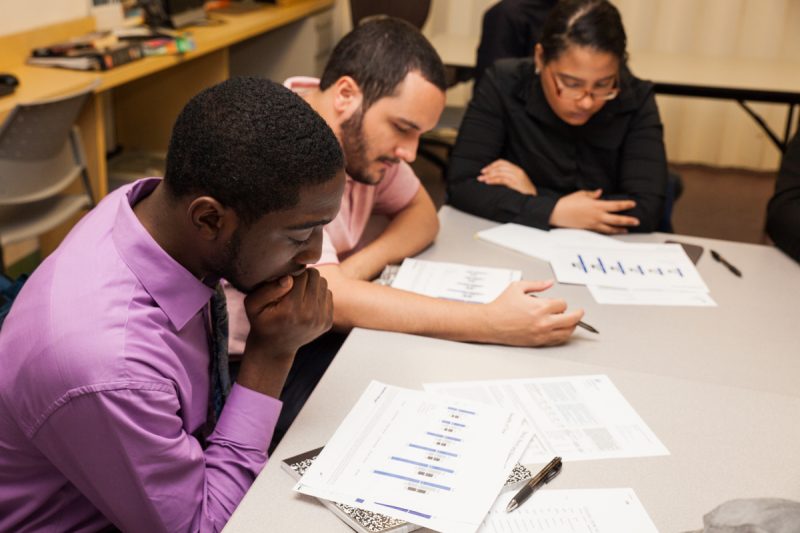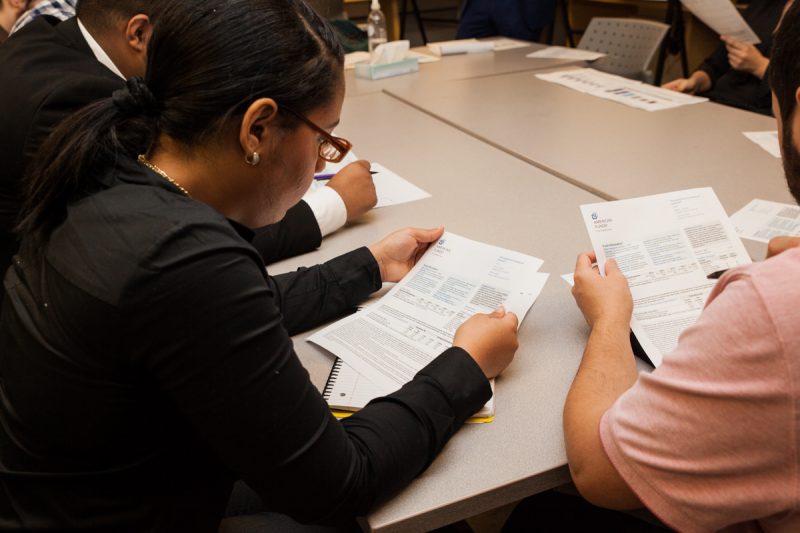- Ryan Sterling, CFA, is a senior vice president and investment counselor at Capital Group, working with high-net-worth individuals and families with at least $5 million.
- Sterling also volunteers with the non-profit Cents Ability teaching financial literacy classes at the Bronx Youth Center.
- Getting an early start is critical to building wealth, he says, as early mistakes can set you back years or even decades.
- Whether you’re a teenager learning about money for the first time or an adult with a history of financial mistakes, the time to take control of your finances is now.
For most teens, financial planning is a topic far from top of mind.
School, sports, and social activities take priority while managing credit, creating a budget, and saving for retirement feels like a long way off. That said, life hits you pretty fast and before you know it you go from being a carefree teen, to a young professional with student loan and credit card debt. Living paycheck to paycheck with no savings – or a plan to build savings – can very much feel like you’re hanging on by thread. And, in many ways, you are.
This is the way the founders of the New York based non-profit Cents Ability, Alexa DuPont and John Moore, felt when they first entered adulthood. Even though they were college educated with good entry-level jobs, they felt paralyzed by bills. Dupont and Moore realized they had a huge knowledge gap when it came to managing their finances and building wealth.
As a result, they created Cents Ability to help teens achieve their goals through learning how to manage their finances. I partner with Cents Ability and use their curriculum when teaching my financial literacy class at the Bronx Youth Center and, while this advice is tailored to teens, it certainly applies to anyone with a desire to build and grow wealth.
Set financial goals.

Like anything, the key to building wealth starts with a goal to build wealth.Sounds obvious, but when life happens, it's easy to lose focus as career and personal goals take precedent.
Whether your goal is to have $1 million saved by 40, buy a home, retire at 60 or start a business in 10 years, it all starts with a goal. Write your goals down and put it through the SMART framework (specific, measurable, achievable, realistic, and timely). By going through this exercise you will be absolutely clear about what you are working towards and you will be more inclined to hold yourself accountable.
Create and hold yourself accountable to a budget.

For building wealth, all plans start with a budget. Without a budget it becomes easy for expenses to get out of control and to lose track of where income is going.
A weekly exercise I personally go through is to write down all of my expenses so I know exactly where I'm spending my money. Mot importantly, within my budget, I keep a line item for savings.If you commit to saving a set amount each month as part of a budget, it will eventually lead to a routine and you'll be surprised with how quickly your savings account adds up.
My students are often surprised to hear that all of my high net worth clients have budgets and I respond by saying there is a good reason why they have achieved their level of wealth. Do what the wealthy do and know where your money is going.
Participate in your company's 401(k) plan and/or start an Individual Retirement Account (IRA).

A great - and easy - way to pay yourself first is to participate in your company's 401(k) plan. If you are able to meet all of your monthly expenses and contribute the maximum annual amount to your 401(k) ($18,500 in 2018) you certainly should.
I recognize, however, that this may be difficult to do when first starting out but at a minimum, I would advise contributing the amount that you company matches. Otherwise, you're missing out on free money!
In the event your company does not offer a 401(k) or you freelance, you should consider an Individual Retirement Account (IRA). Like the 401(k), you get the benefit of tax deferred growth and, depending on the type of IRA (Traditional vs. Roth), you may get a tax deduction. Speak with a financial advisor to figure out which type of retirement account is right for you. I have yet to come across a client that says "I regret contributing to my retirement accounts when I was younger." If anything, my clients regret not contributing more or starting sooner.
Retirement is expensive and your future self will thank you.
Work toward owning appreciating assets.

"Own something" a colleague once said to me when I was just starting out in my career. That advice sticks with me to this day with one slight adjustment - own things that will appreciate over time.
Most items that we purchase are going to deteriorate and, as a result, are "depreciating assets." These assets include clothes, appliances, furniture, cars, and other "toys." While all of these items are necessary for day-to-day life, we tend to over spend on these "depreciating assets" at the expense of accumulating "appreciating assets" - assets that produce a current stream of income and/or will appreciate over time.
Examples include investing in the stock market, real estate (both personal as well as rental properties), interest in a small business, etc. It is important to note, however, that investing in appreciating assets should come after you have established a solid savings base of at least six months of living expenses.
Focus on the long term.

Like anything truly rewarding, building wealth takes time and practice. Instead of obsessing over your end goal, focus more about making steady progress over time.
I recommend putting together a personal balance sheet every quarter. On this balance sheet list out all of your assets - cash in savings and checking accounts, 401(k)/IRA balance, brokerage account balances, value of your home (if you own), etc. - and net those assets against all of your liabilities - credit card debt, student loan debt, mortgage, etc.
By tracking your progress you will see steady results over time which will give you confidence that your final end goal will be reached. It is important to note, however, that some of the assets you own (most notably, stocks) will fluctuate significantly from quarter-to-quarter and it is critical to contain excitement during periods of strong markets and to maintain a cool head during difficult markets. The key to building wealth in the stock market over time is not about timing the market but time in the market.
Be careful about easy payment options.

I'm amazed with how easy it is to spend your money today.
I used to think we were disconnected from spending by using credit cards but now with easy online checkout options, same day delivery, and the ability to pay with your phone and watch, retailers have made it incredibly easy to spend money with close to zero thought or effort.
While I enjoy the conveniences of modern technology, I also understand the basic notion that the harder I make it on myself to buy something, the less inclined I am to do it. If you commit to walking or driving to the restaurant instead of ordering online for delivery, the better the chances are that you will discover you already have food in your home that will probably go to waste otherwise.
If you commit to going to the department store to buy that clothing item you see online instead of checking out from your tablet, the more likely you are to only buy if it is something that you really want as opposed to a just a "nice to have."
Studies show that if you pay with cash you are less inclined to overspend as you experience more pain from letting go from cash in your wallet than swiping a credit card or flashing your watch. Bottom line: make spending difficult.
Know and watch your credit score.

Having a good credit score will lead to better interest rates when buying your first home, refinancing student loans, or any other major life purchase that involves borrowing.
Many young adults underestimate how easy it is to damage your credit and, once damaged, it can take a long time to repair. The most important components of your credit score are payment history and debt to credit ratio so make certain to never miss a credit payment and make it a best practice to pay off your credit card balances in full.
Not only will you avoid accruing unnecessary and costly interest but you will also lower the interest you will have to pay on future credit for important assets like a home. Think of an interest rate as the cost of money and, like anything, you want to cost to be as low as possible.
Be honest with yourself.

I know this is easier said than done, but one of the most important pieces of financial advice is to be honest with yourself about your financial position.
I recognize that this can be scary but it is impossible to build wealth if you don't face reality. Whether you are just starting out and do not want to admit that you can't go on that trip because of your budget, or you're trapped by past financial mistakes and want to ignore the problem, the only way you will take a step in the right direction is to be honest with yourself, your friends, and your family.
You would be surprised how willing true friends are to adjust plans to fit your budget (they actually may feel the same way) and how family can make a difficult time a little less difficult. It's similar to your physical health - if you ignore it, preventative diseases and ailments can turn into something much worse.
If you neglected your finances in the past and feel like you're in a deep hole, don't panic, there is always a way out. The journey to $1,000,000 starts with being honest about where you are and where you want to be and before you know it, you will see progress.

